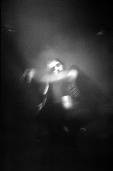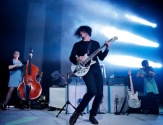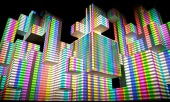Arcade Fire
When Arcade Fire played the Astoria in London in 2005, regrettably, I couldn’t go.
Funeral, their debut album was out and the world was discovering Canada as the new frontier of Indie-Music.
It will take almost ten years to have the chance to get to see them live. During this time from a promising emerging band they became one of the greatest in the world.

Music-wise, up to that times, Montreal (Quebec) to me meant only Godspeed You! Black Emperor.
In the space of few years many appeared from there (apart from Of Montreal which are, actually, not from Montreal).
From Rufus Wainwright to Patrick Watson, from the Dears to the Stills to Besnard Lakes, Quebec was pioneering not a clear trend in music that quickly spread like wildfire from Quebec capital.
Arcade Fire have become, album after album, the leaders of the army who brought symphonic pop to the mainstream.

Their story begins around 2001 when school friends Win Butler and Josh Deu form the band. Deu will leave in a couple of years but Arcade Fire ensemble grew.
The band is fronted by Win Butler and his partner, in life and music, Régine Chassagne.
Many people took part in the large line-up, many are multi-instrumentalists. Among them it is worth mentioning Richard Reed Parry; Win’s brother William; Jeremy Gara on drums and Tim Kingsbury.

Funeral their first album came out in 2004. Ten years later it has a key place in the “best album of” this millennium.
This is not a hyperbole.
The century opened dominated by indie-garage bands. Funeral overwhelmed raw arrangements with orchestral ensembles. Violins took places of guitars. Accordions, percussions became cool and a cheerful approach in fancy dress reinvented ‘folk’ as we knew it. Many followed, from Montreal to Vancouver than down to Seattle, the States and in the end this old world where they arrived tonight.

I have read any definition of Arcade Fire during the years.
Baroque-pop and post-punk sound mutually exclusive but both appear in their wiki page. There is also art-rock that is probably the most appropriate. A friend of mine coined ‘pomp-rock’, a bit devaluating but the funniest.
Another friend, a music journalist, puts it simply: “music journalists, when do not know how to define a band nowadays, write that they are inspired from Arcade Fire”.
It says it all. Arcade Fire become a reference for contemporary rock music, recognisable but still difficult to define.

Easily all can be embraced by the AAA pass of “indie-rock” but for a band which won Grammys, publishes on Mercury (a.k.a. Universal Music) and plays for Obama the ‘indie’ definition shows only the meaningless of the term as a genre.
RIP Indie-Rock. Long live Arcade Fire.
Funeral was followed by Neon Bible in 2007. Not as magnificent as the debut (none of their LPs is, to me) but the expectations were so high that they started to play any other TV show and helped to get bigger, biggest… huge. Arcade Fire played for Obama campaign in multiple occasion guaranteeing a visibility unprecedented to an alternative Canadian band.

The Suburbs, their third album, was out in 2010. Expectations were even higher. Arcade Fire have a big merit, they are bold and confident. If the third album is the most difficult exam in a band’s career, they passed it with full marks.
In its 8 different covers, The Suburbs is number one about everywhere in the world. Less baroque than Neon Bible, more organic as a piece of work (which helps the art-rock tag) and has the songs, the concept and the style.
It grows from the opener, the self-titled ballad, The Suburbs, adding song by song elements of complexity that culminates in the beauty of Sprawls II. Régine singing is so powerful that in few months the world will be dancing to her falsetto.

Twitter told me Arcade Fire were playing two ‘intimate’ gigs in London. To put intimate in context, the Roundhouse is one of the biggest theatres of the city and all the tickets went in a matter of seconds.
They hid their shows to keep them to fans announcing themselves as “The Reflektors“. Easily spotted.

Reflektor is the title of their fourth, double album.
It confirms Arcade Fire are not an easy listening band. They are good on writing tunes but better on arranging them.
This was and still is the main revolution (if there is still some space in music for this word) they must be proud of.
Attention to sound, to instruments choice, to sonic effects, to production and, last but not least, to image. Every little details.
Something forgotten since David Bowie retired Ziggy from the scenes. And Bowie is a fan of the band, one of his latest public appearance was on stage with Arcade Fire in 2005 and he also recorded a cameo in the song Reflektor. The song opens the gig tonight. Bowie, expectedly, will not materialise.

Indie-Rock may be dead as a genre but, ten years on, Arcade Fire are alive and kicking (everyone else off stage). In the near future they are not going to play in a place so ‘small’ again.
Reflektor is a very complex album. It opened a competition on who could write a review with journalism all over the globe attempting and many failing to put some meaningful words around it. I will not try. Rather read my winner, Alexis Petridis on the Guardian or second close, Pitchfork’s 9.2 Best New Music tag including the brilliant quote:

“If something that happens on the internet can be considered An Event, then this certainly was one; in the same moment I saw the band’s official tweet announcing it, two people simultaneously instant-messaged me the link. It was late afternoon on the East Coast, lunchtime on the West, and in that moment I did exactly what thousands of other people in those and all other time zones did: Stopped what I was doing, closed some extraneous tabs and programs, and listened […] This scene would have seemed bizarre—and likely a little sad— to us decades ago, and it’s frightening to imagine how quaint it will seem in the future. But this is how a lot of people at this moment in time—the one in which Reflektor was made, and the one it distrustfully interrogates—discover new music: Alone; together.”

This sense of ‘alone; together’ is present in the Roundhouse tonight as well. Anytime a mirrorball or a confetti rains happens, hundreds of arms holding mobile phones raise in the air to document the moment and to share it, alone; together. The fact that we have friends next to us seem less important than impressing friends far from us. A Psychologists’ dilemma.
Arcade Fire dilemma, on the contrary, was to promote the new songs avoiding to please the crowd with the big hits. They’re bold so they did it straight.

Most of the songs they play are from Reflektor. There will be no Wake Up, their most famous, only Power Out and Haiti from the debut. Nothing from Neon Bible and only Sprawl II from The Suburbs arrives in the encore. It makes perfect (marketing) sense that The Reflektors came to London to play Reflektor, it is also very important for them to test ride the songs live.
They need to get the vibes that I expected and were often missing. Towards the end the concert gets better, There are confetti at the main set and the encore closes in stile with a beautiful rendition of Supersimmetry.

It all looked more as a run-through the tour that will bring them everywhere in 2014. The fans who listened to the band’s appeal and arrived in fancy dress (not many to be fair) are left wanting some more. They deserve it.
The power of Arcade Fire is in 4 albums each with some great songs. This show was a Reflektor launch, but 2014 will be a big touring year for them. They must win their overconfidence and do not stick to play only the recent material.
Crowd pleasers are made to please crowd. They have no reason not to please their fans.
Follow Arcade Fire for more info [website][facebook][twitter][spotify]

Photo tip
It was not easy to get into the Roundhouse press pit for one of these two nights Arcade Fire brought Reflektor in London. And not because the pit was split in two and slimmed down by the addition of a small platform bridging the stage with the fans. In details 34 e-mails, to 5 different people over a couple of weeks.
Probably the most anticipated band for a massive 2014 touring; already announced as headliners for Primavera Sound in Barcelona; with a multi Arena USA tour upcoming; and my money on one of Glastonbury 2014 top acts, Arcade Fire is the band on the news. Many news.

If you aim to be a concert photographer, to work with an agency seeking to sell pics to newspapers, the difference between shooting the first or the second night is everything. The main reviews, the ones with photos, always cover the first night and the sellable images must be shot on that gig.
So first date is your goal. Remember this.
Second, the photos have to get to the agency fast. it is not important your photo is good, it is important your photo is first. Sad, I know.
Like a google search, more often than not, the selected image by a journal picture desk in a hurry to close the daily edition is one on the first row of the agency screenshot.
There are bad photos on newspapers, worse than the ones on magazines, because they have less pressure and more time to select.

I think this is, first, a photo editors’ fault. They are responsible of the photo quality of the paper and should pick only the outstanding shots.
Second, it is a photographers’ fault too. We should not send too many image for each gig. Not the bad ones. Not the mic in face ones.
Overall the fault is on the digital era, fast to consume (and faster to forget) media material.
Reviews must be asap. Next day on tabloids (as Metro or the Evening Standard) next hour on photo reviews on webzine. Sometime is so quick the photos are up before the gig is over.

This hurts concert photography. Even great and iconic images, when exist, get lost, forgotten in the mare magnum in few hours.
The once blamed “3 songs rule” is incredibly becoming accepted (by photographers).
I spoke to several ‘pros’ and they don’t care of having the opportunity to shoot more than three songs. Some said that one song is enough.
It is a compulsive obsessive approach, (burst) shoot and rush to the tube, to Lightroom, to ftp. Every day.
I am enjoying concert photography much more since the day I stopped the gig bulimia of seeing as much as possible.
Selecting few help me to concentrate, to organise and, most important, to find a photographic language that I hope builds a consistent portfolio. Which is why photographers are recognised.
Someone did.








